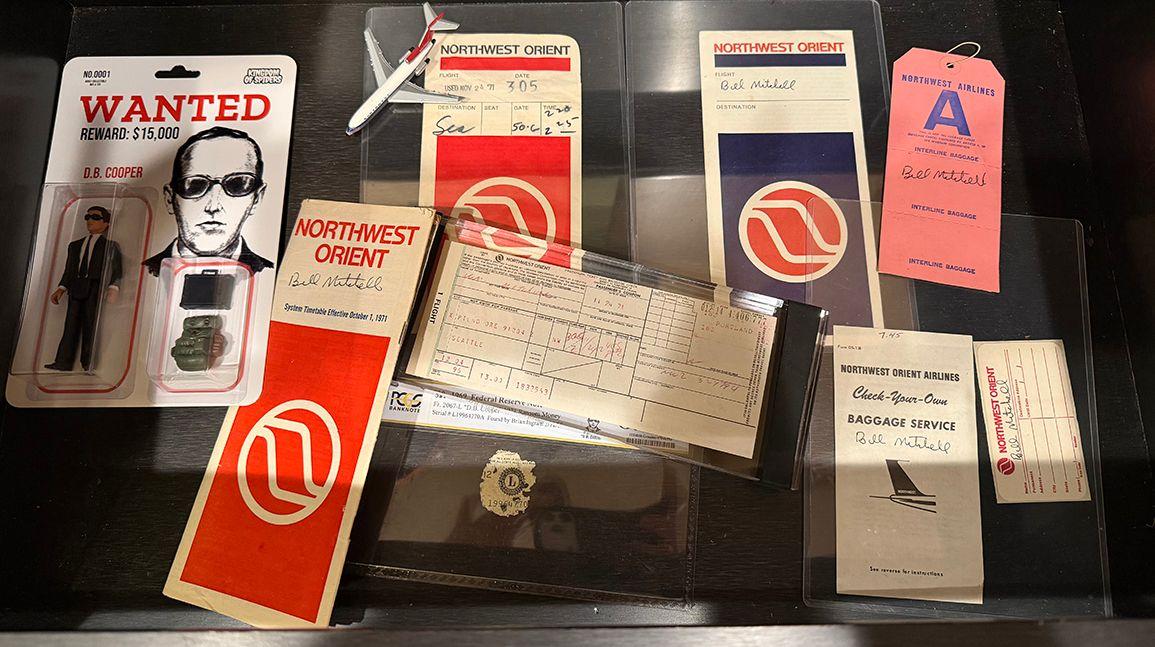When collecting sports memorabilia, my strategy is simple: Try to get the rarest items of the greatest players.
But my collection happens to be equally split between sports and history, and collecting historic items is significantly harder.
Population reports don't exist for Abraham Lincoln autographs or cartes de visite. How many Steve Jobs business cards are out there? How many times did Albert Einstein signatures with the inscription "E=mc squared"?
And then there's this: Babe Ruth and Mickey Mantle are in no threat of getting lost to time. Are our Founding Fathers? Is the RMS Titanic?
And what about liquidity? Historical items have a higher arbitrage opportunity if you can identify something that currently has (or someday will have) more value than it's being priced at, but to sell it, you have to be able to tell that story to the world.
In many ways, it's a harder game to play, but I've found it more rewarding.
In a world where we are competing more and more for the "Wow," a dollar that was in the pocket of a passenger on the Titanic — on its face alone — means more to me than the greatest 1952 Topps Mickey Mantle card. To me, it's about the story behind the item.
The "Wow" part of a PSA 10 1952 Mickey Mantle is less about seeing it and more about knowing its price ($30 million-plus)
The reward on collecting history for me is twofold: The potential arbitrage and the chase.
You want a PSA 7 Mickey Mantle, you can find one pretty easily. You want the pen from the last bill President Kennedy signed? Good luck.
With history, my strategy has been to buy pieces attached to stories that will never go away. Those are stories my 11-year-old twin boys and my 13-year-old daughter already know about because they've seen them on endless YouTube clips.
I've narrowed it down to four. All of them have an element or a potential element of tragedy, which I think makes them become an indelible part of life.
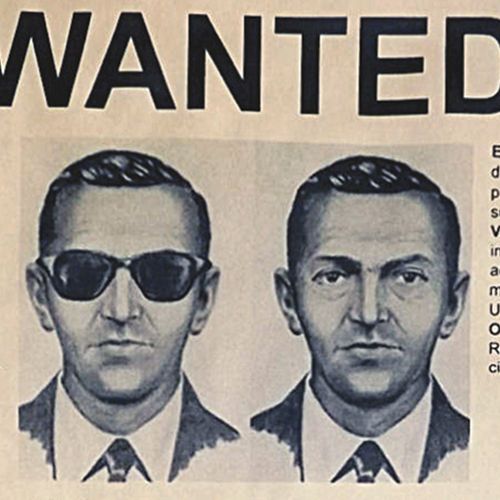
The sinking of the Titanic in 1912. The Alcatraz escape in 1962. JFK's assassination in 1963. And D.B. Cooper's skyjacking in 1971.
Outside of JFK, none of these events are particularly easy to collect.
Titanic items, perhaps buoyed by the success of James Cameron's 1997 film, are very pricey. My two items are the 1899 $1 silver certificate that was in the pocket of passenger Ernest Tomlin and a funeral program of Wallace Hartley, the heroic bandleader on the ship.
Alcatraz is also challenging as signatures of Frank Morris and the Anglin Brothers are nearly non-existent. I do have their FBI posters.
And now, we get to the man they called D.B. Cooper. On Nov. 24, 1971, Cooper famously skyjacked Northwest Orient flight 305 from Portland to Seattle. He said he had a bomb and asked for $200,000 in cash and four parachutes.
After stalling in the air, the plane landed in Seattle. The cash, with the serial numbers marked by the FBI, and the parachutes. were delivered and Cooper let all the passengers off the plane. Cooper's wish was to take off again and soon after the plane was airborne, he deployed the rear stairs of the 727-51 and, based on the pressure drop in the cabin, jumped out at around 10,000 feet somewhere over southwestern Washington.
Despite the projections and an intense search, no man was ever found in this area, making it the only unsolved skyjacking in American history.
To compound the mystery, some of the ransom money was found near Washington's Columbia River, by an 8-year-old boy in February 1980, more than eight years after the event. Despite a million clues, and a 45-year investigation that wound down in 2016, no one has definitively identified this man.
I heard about Cooper for the first time in, I want to say, 2010. That was before the swarm of documentaries that came on the topic in the last decade.
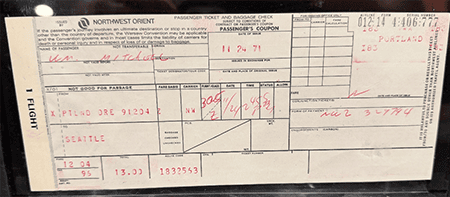
The following year, I received an email from Charlie Mitchell, who said his father, Bill, sat across from Cooper on that fateful flight. Over the next couple years, I would tweet the story on the anniversary.
In the years that followed, I acquired one of the found bills, but I wanted something with a more meaningful connection.
In September 2023, I went out to Arizona to emcee the Michael Phelps Foundation event at Silver Leaf Golf Club in Scottsdale. I was greeted there by a woman named Stacy Beadle, who was program manager for the foundation. Beadle had followed me on social media and told me she knew I had an interest for D.B. Cooper. She had something to tell me.
Her maiden name was Mitchell, and her dad was Bill. It was her brother who had emailed me some 12 years before. And she knew my love for collecting tickets.
"He has his ticket, too," she said.
My mind was blown. I searched for tickets before, and no one had one — except for the FBI, which had D.B. Cooper's boarding pass in its files.
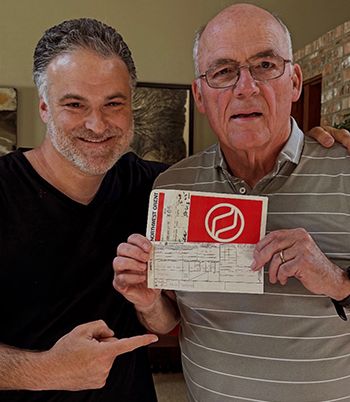
Over the next two years, I communicated with Stacy about the possibility of acquiring the ticket. We discussed what the right price would be, but her father was resigned to passing along the item to his heirs when he passed away.
As the mystery of D.B. Cooper continued to grow, I got more aggressive.
This summer, I traveled to a suburb outside Seattle to talk to Bill about the possibility of letting go of his piece of history. My reasoning: The ticket would be more valuable with him being able to tell his story and getting it signed by a notary.
He talked about auctioning it, but money wasn't his primary motivation. In the end, I convinced him that I would be the best custodian of its future.
We met Oct. 21 in Arizona, where he sold me the ticket and the enveloped it came in. I had him sign some pieces of vintage Northwest/Northwest Orient Airlines items and sign an affidavit in front of a notary.
I think this might be the very best piece I have in my collection, and I'm so happy Bill blessed me with being its next storyteller.
Bill wrote this detailed statement about passing along the ticket:
I, Bill Mitchell, hereby certify that these two items — an original passenger ticket from Northwest Orient Airlines Flight 305 and a ticket envelope, both dated Nov. 24, 1971 — are the one and only ticket and envelope that was saved by my mother following the events of that day. I didn't even know she had it, but when she died, we found it in her home. It has remained in my personal collection ever since.
This ticket was the standby ticket that I bought at the airport desk that day. I had an unassigned seat and wound up sitting across the aisle from someone whose ticket said Dan Cooper. He later became known as D.B. Cooper.
Flight 305 was a short flight from Portland to Seattle. I was coming home from college for Thanksgiving. I told my dad what flight it was and to pick me up some 40 minutes later. "Cooper" had other plans.
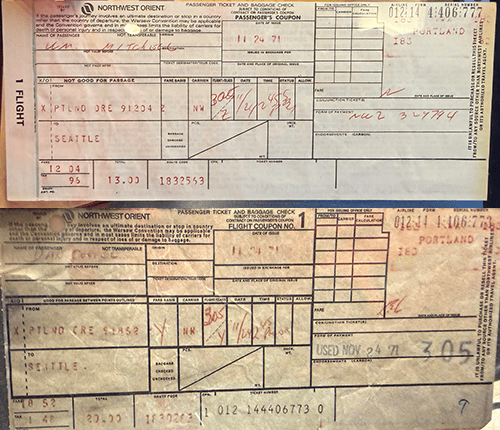
Unbeknownst to any of us on the plane, he had told the flight attendants that he had a bomb and started to make demands. My mom had started to panic. She was making me dinner and saw on the news that the Seattle fireboats had found out that the plane was hijacked, and they were circling in the water so that they could pick up the bodies when the plane blew up.
At the airport, Northwest called the families in and admitted that there was a bomb threat, but that all demands would be met.
Meanwhile, back on the plane, I'm not really worried. After circling and dumping some fuel, the pilot says we're going to land. It was at that point that one of the flight attendants comes up to me and says, "We're going to ask you please move up forward." And the "please" really got me. So I moved up about halfway.
When we land, I can see it's a stormy, rainy night. They open the doors, and the flight attendant takes a bag, that we later found out had $200,000 cash in it, and brings it to the back of the plane. And they say, "OK, you can get off."
And we are miles away from the terminal. They had one of the sharp shooters from the county on the outside ready to pick him off. But he knew enough to ask for the lights to be shut off and to stay inside.
Walking out of the plane, I see this pile of stuff on the floor, which turned out to be the parachutes he asked for.
I still have no idea what is going on. I walk down the stairs and someone asked if we were hijacked. And there is an FBI agent standing there, and he says yes. I look around for the guy who was sitting across from me and realize he wasn't there.
We get on a bus that brings us to the terminal and another agent shows us his badge and says, "I'm going to go through the names to see who we get."
The first name is William Mitchell. Me! I thought it was because I student, and I was standby. Later, I learned it was because I was the last one on. The name that came next was Dan Cooper.
We went into the Northwest VIP room, and there must have been 20 agents. At one point an agent turned to me and asked if I had seen anything unusual. I said, "Yeah, there was a guy sitting next to me." And then they had a lot of questions for me. When they let me go, they told me that they'd probably visit me tomorrow.
There were about 100 news people outside the door and that they would prefer for me not to talk to them because I was the prime witness besides the flight attendants. But I asked the FBI agent, how the hell was I going to get through?
He had a plan. He gave me sandwich and told me that when the doors opened, it would push the people back. And I should just walk through the middle eating the sandwich and don't stop walking. And I did that, and it worked.
I saw my dad. He went to the pay phone to call my mom and to say that I was safe. When I got home, I was not really comprehending the gravity of it all.
I studied political science in college, but I wound up working for Boeing. The funny thing is no one really cared about D.B. Cooper, at least nationally, back then.
In 2000, The Oregonian wrote a story about Jo Weber, who said her husband, Duane, whispered on his deathbed to her that he was Dan Cooper. The article said she was looking to speak to any of the passengers, including the “college student who sat across the aisle from him.” My daughter emailed in and said it was me.
After that, a lot of people contacted me, including Jo Weber. She wanted me to verify it. I didn't think it was him. His ears were huge. I would have remembered that.
Then came the Internet and all the documentaries. People found my address and all these people would write me asking if I thought their lost relative was D.B. Cooper.
The FBI did come back to me many times, in fact I met with them three times a week for a year, and they gathered as many people as they could. At least 10 people at a time. I saw every person at every military parachute club that existed. I just kept saying no. Sometimes they would bring photos and I would say, "You showed me this guy last week!"
I thought he was older than the drawings made him out to be. He had the turkey wobble on his neck, which made me think he was closer to 50. But I don't think I ever saw the person who it was.
For what it's worth, I don't think he survived the fall. In the Pacific Northwest, there are way too many obstacles one is likely to hit before getting to the ground.
For most of my life, it didn't really bother me. Until I went to the 9/11 memorial in Shanksville, Pa. and saw the pictures of all the families. and it struck me that that could have been me. I feel fortunate that it turned out another way.
Bill Mitchell, passenger, Northwest Orient Airlines Flight 305
Want more stories like this? Subscribe to the cllct newsletter and follow cllct on X and Instagram.
Darren Rovell is the founder of cllct and one of the country's leading reporters on the collectibles market. He previously worked for ESPN, CNBC and The Action Network.
